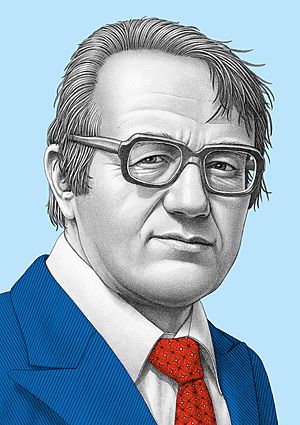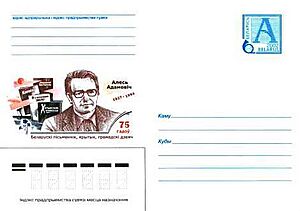Ales Adamovich facts for kids
Quick facts for kids
Ales Adamovich
|
|
|---|---|
 |
|
| Native name |
Алесь Адамовіч
|
| Born | 3 September 1927 Konyukhi, Byelorussian SSR, Soviet Union (today Belarus) |
| Died | 26 January 1994 (aged 66) Moscow, Russia |
| Occupation | Writer and critic |
Aleksandr Mikhailovich Adamovich (Belarusian: Аляксандр Міхайлавіч Адамовіч, Russian: Алекса́ндр Миха́йлович Адамо́вич; 3 September 1927 – 26 January 1994) was a Soviet Belarusian writer. He also worked as a screenwriter, a literary critic (someone who studies and judges books), and an activist for democracy. He wrote in both the Russian and Belarusian languages.
When he was a teenager, Adamovich fought as a child soldier in the Belarusian resistance during World War II against the German army. Because of this, many of his books and screenplays are about the German occupation of Byelorussia during World War II and the brave partisan fighters in Belarus. Some of his most famous books are Khatyn and The Blockade Book. He also helped write the screenplay for the movie Come and See.
Adamovich was a strong critic of Stalinism (the harsh rule of Joseph Stalin) and the Soviet system. He supported many groups that wanted more freedom and democracy in the Soviet Union. He was known for being honest, brave, and for his strong anti-war message.
Contents
Early Life and World War II
Aleksandr Mikhailovich Adamovich was born on September 3, 1927. His birthplace was the village of Konyukhi in the Minsk Region of what was then the Byelorussian Soviet Socialist Republic. Both of his parents were doctors.
When he was young, his family moved to the village of Glusha. During World War II, when Adamovich was 15 years old, he joined a partisan group in 1943. Partisans were people who secretly fought against the enemy in their own country.
After the fighting in Belarus ended in 1944, Adamovich went back to school. He studied at the Belarusian State University. He later continued his studies in Moscow to become a screenwriter.
Adamovich's Writing Career
Adamovich became a member of the Union of Soviet Writers in 1957. However, he didn't like this organization much. He felt it supported the Soviet government too strongly.
In 1962, Adamovich started teaching Belarusian literature at Moscow State University. But he was fired in 1966. This happened because he refused to sign a letter that condemned (spoke out against) writers who disagreed with the Soviet government. These writers were called dissidents.
In 1976, he received the Yakub Kolas Belarus State Prize for literature. This was for his book Khatyn.
Most of Adamovich's books were about the German occupation of Byelorussia during World War II. His most famous works include the short novel Khatyn and the collection of true stories I am from the Fiery Village. For I am from the Fiery Village, Adamovich worked with two other Belarusian writers. They interviewed 300 people who survived the German occupation of Belarus.
In 1989, Adamovich helped start the Belarusian branch of PEN International. This is a worldwide group of writers who promote friendship and intellectual cooperation. After Adamovich passed away in 1994, the Belarusian PEN Centre created the Ales Adamovich Literary Prize. This award is given to talented writers and journalists.
Adamovich's Work for Change
Adamovich's grandfather was arrested in 1930 and sent away from his home. This happened under the rule of Joseph Stalin. Because of his family's difficult experiences, Adamovich became a strong critic of Stalin's rule and the Soviet political system.
In 1982, Adamovich was part of the delegation (group of representatives) from Belarus at the United Nations General Assembly.
After the Chernobyl disaster in 1986, a terrible nuclear accident that greatly affected Belarus, Adamovich worked hard. He told the Soviet leaders about the serious effects of the disaster.
From 1989 to 1991, Adamovich was a member of the Congress of People's Deputies of the Soviet Union. This was a group of elected officials who wanted to bring changes to the Soviet Union. Adamovich also strongly supported the Belarusian Popular Front. This group worked for democracy in Belarus.
After the Soviet Union broke apart, Adamovich stayed in Russia. He continued to speak out against communism. He also became a co-chair of the Memorial organization. This group works to remember victims of political repression. In October 1993, during a political crisis in Russia, Adamovich signed a letter supporting Boris Yeltsin, who was the President of Russia.
Death and Lasting Impact
Ales Adamovich passed away on January 26, 1994. He was 66 years old. His wife said he died from a heart attack. He died shortly after giving testimony in a legal dispute.
The Russian news agency TASS remembered him as an important public activist. They said he worked hard to make democracy stronger in Russia. Adamovich had asked to be buried in Glusha, next to his parents.
Today, Adamovich is seen as one of Belarus's greatest writers. His books have been translated into more than 20 languages. Svetlana Alexievich, who won the Nobel Prize in Literature in 2015, called Adamovich her "main teacher." She said he helped her find her own way as a writer.
Awards and Honors
- Order of the Patriotic War 2nd class
- Order of the Red Banner of Labour
- Order of the Badge of Honour
- Medal "To a Partisan of the Patriotic War" 2nd class
- Medal "For the Victory over Germany in the Great Patriotic War 1941–1945"
In 1997, Ales Adamovich was given the "Honor and Dignity of Talent" award after his death. Other famous writers and thinkers also received this award.
Selected Works
- Novels and Stories
- Partisans (in Russian, "Партизаны"), a novel (1960–63). A film was also made with the same name.
- Khatyn, in Russian, "Хатынская повесть", published in 1972. It was originally written in Belarusian.
- I am from the Fiery Village ("Я з вогненнай вёскі"), written with Janka Bryl and Uladzimir Kalesnik, 1977.
- Chasteners ("Каратели"), 1980.
- The Blockade Book ("Блокадная книга"), written with Daniil Granin, 1977–81. It was written in Russian and later translated into Belarusian.
- Criticism
- Problems with the New Way of Thinking, Ales Adamovich's writing was often seen as new and important in the Soviet Union.
- Screenplays
- Voyna pod kryshami, 1967
- Come and See, written with Elem Klimov (Иди и смотри, 1985).
- Franz + Polina, 2006
- Chitaem 'Blokadnuyu knigu', 2009
See Also
 In Spanish: Alés Adamóvich para niños
In Spanish: Alés Adamóvich para niños


